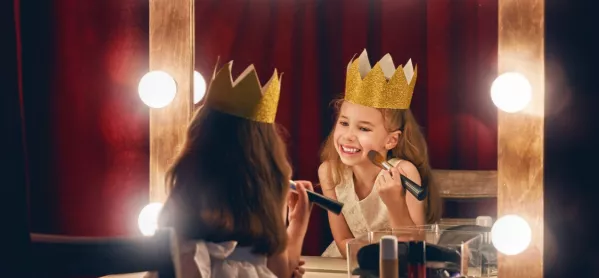Our Year 6 children are leaving primary school today, and I’m having mixed feelings about it. I’ve known many since they could barely see over the nursery sandpit. For some, this school has been an extension of home life (or a refuge from it) for as long as they can remember. The thought of them making their own way through the hormone-entangled jungle of secondary education is scary.
And, if today is anything to go by, I have reason to be concerned. The children, who only this morning were bouncing off the walls with excitement, are this afternoon weeping profusely over each other’s autograph-covered T-shirts. And maybe I’m partly to blame. Where else did they learn to display raw emotion, if not in my drama class?
Transition: Why we put Year 6 on a secondary timetable (for a week)
Opinion: When moving to secondary school is a step too far
Secondary: How the ‘broken’ education system casts students adrift
Transformation scene
While I look for a space to sign Delia’s shirt, she confesses to being a bit afraid about the future. Her new school and its students are much bigger than she expected. I remind her of how timid and quiet she was in her first drama lesson. “Who would have thought back then that you’d play Lady Macbeth in our summer production of The Day The Woods Came To Dunsinane?”
After only a few workshops (and several exhausting rehearsals), Delia was transformed. She was no longer that painfully self-conscious child who had to be coaxed into performing in front of others. Somehow, she had metamorphosed into the most ruthlessly ambitious woman who ever ordered a husband to steal a throne by murdering his king.
Playing a role
Ironically, most of the children who take part in our end-of-year show are like Delia to begin with. They arrive at the audition feeling embarrassed and afraid of making a fool of themselves. But they come in spite of this. And, once given parts, they are the ones who never miss a rehearsal, learn lines quickly, follow directions precisely, and are committed to performing.
If drama lessons teach us anything, it is that the way we see ourselves is not set in stone. Playing a role gives people a chance to free themselves from any negative self-images. And, more important than this, it gives them a chance to experiment with being someone else. Someone brave or bold or funny, or even murderously insane.
It’s four weeks since the final curtain fell. The fake daggers are stored where no one will ever find them, and all trace of the face paint that brought ghosts, trees and witches to life has been scrubbed away. Even the cauldron where the Weird Sisters stirred poisoned entrails to create a brew most loathsome, foul and cruel to poison brats from Arbourthorne School, is back in Mrs Batty’s garden, nurturing her petunias.
More exciting than scary
I persuade Delia that going to secondary school will be a bit like the first time she came to drama class. “It’ll be more exciting than scary - like learning to play a new character in a new play.”
I sign her shirt and move on to the next, certain that Delia will strut and fret her hour upon the stage of adolescence with the best of them. I just hope she doesn’t think Lady Macbeth is a good role model.
Steve Eddison is a teacher at Arbourthorne Community Primary School in Sheffield




